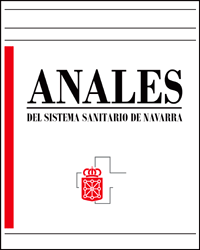A 56-year-old woman with ampullary adenocarcinoma and acute pancreatitis
##plugins.pubIds.doi.readerDisplayName##:
https://doi.org/10.23938/ASSN.0105Gako-hitzak:
Acute pancreatitis, Adenocarcinoma, Ampullary carcinoma, Endoscopic-retrograde cholangiopancreatography (ERCP), Transpapillary biopsy.Laburpena
This challenging condition has scarcely been reported on. A 56-year-old woman was admitted with jaundice, and laboratory data were indicative of pancreatitis, which recurred in spite of adequate clinical and nutritional management. The patient was an overweight diabetic using metformin, who had antecedents of cholelithiasis and recent cholecystectomy. Clinical and laboratory features were not conclusive about the cause of this acute pancreatitis. However, imaging data contributed to diagnosis suspicion, and the histopathology study of the transpapillary biopsy confirmed the ampullary adenocarcinoma. Whipple’s surgery was the procedure of choice, associated with radical lymphadenectomy, followed by an uneventful outcome. Recrudescence of signs and symptoms of acute pancreatitis, with elevated serum levels of bilirrubins and of hepatic canalicular enzymes, should enhance the suspicion index about periampullary tumors. High levels of CA 19-9 can constitute a useful marker of this condition. Transpapillary biopsy can characterize the diagnosis of ampullary malignancies.
##plugins.generic.usageStats.downloads##
##submission.downloads##
Argitaratuta
##submission.howToCite##
Zenbakia
Atala
##submission.license##
##submission.license.cc.by-sa4.footer##La revista Anales del Sistema Sanitario de Navarra es publicada por el Departamento de Salud del Gobierno de Navarra (España), quien conserva los derechos patrimoniales (copyright ) sobre el artículo publicado y favorece y permite la difusión del mismo bajo licencia Creative Commons Reconocimiento-CompartirIgual 4.0 Internacional (CC BY-SA 4.0). Esta licencia permite copiar, usar, difundir, transmitir y exponer públicamente el artículo, siempre que siempre que se cite la autoría y la publicación inicial en Anales del Sistema Sanitario de Navarra, y se distinga la existencia de esta licencia de uso.








